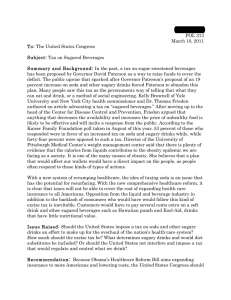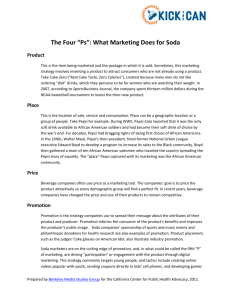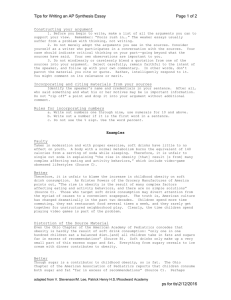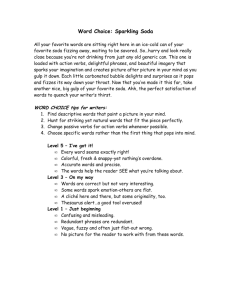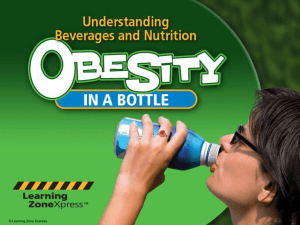Should the Government Tax Your Coke
advertisement
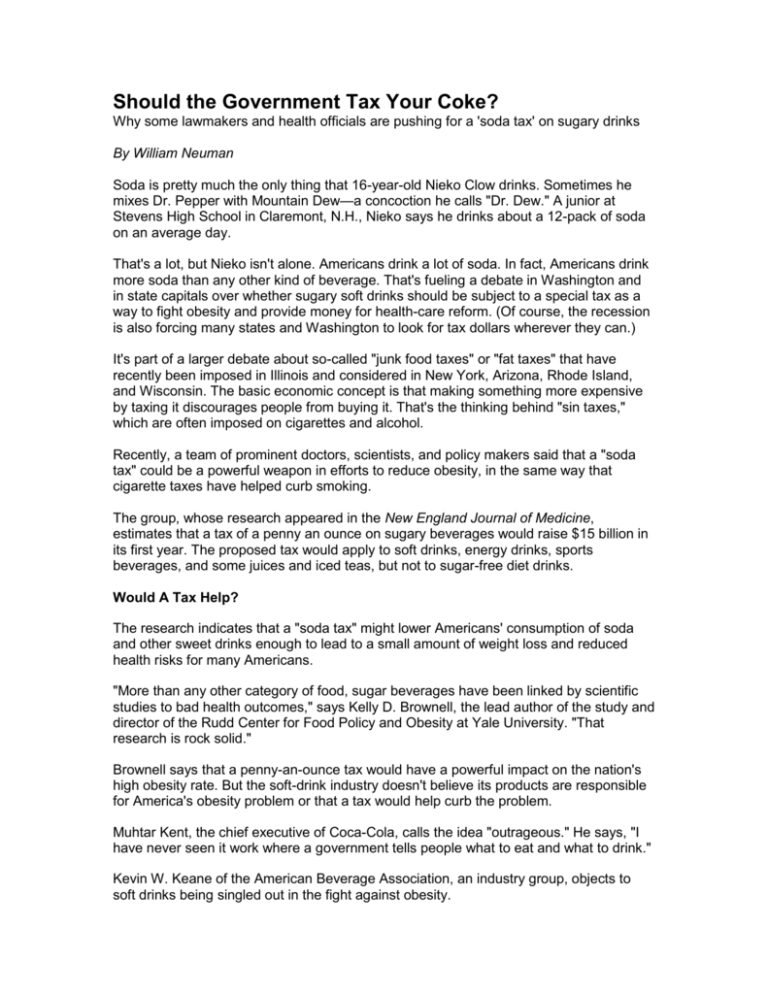
Should the Government Tax Your Coke? Why some lawmakers and health officials are pushing for a 'soda tax' on sugary drinks By William Neuman Soda is pretty much the only thing that 16-year-old Nieko Clow drinks. Sometimes he mixes Dr. Pepper with Mountain Dew—a concoction he calls "Dr. Dew." A junior at Stevens High School in Claremont, N.H., Nieko says he drinks about a 12-pack of soda on an average day. That's a lot, but Nieko isn't alone. Americans drink a lot of soda. In fact, Americans drink more soda than any other kind of beverage. That's fueling a debate in Washington and in state capitals over whether sugary soft drinks should be subject to a special tax as a way to fight obesity and provide money for health-care reform. (Of course, the recession is also forcing many states and Washington to look for tax dollars wherever they can.) It's part of a larger debate about so-called "junk food taxes" or "fat taxes" that have recently been imposed in Illinois and considered in New York, Arizona, Rhode Island, and Wisconsin. The basic economic concept is that making something more expensive by taxing it discourages people from buying it. That's the thinking behind "sin taxes," which are often imposed on cigarettes and alcohol. Recently, a team of prominent doctors, scientists, and policy makers said that a "soda tax" could be a powerful weapon in efforts to reduce obesity, in the same way that cigarette taxes have helped curb smoking. The group, whose research appeared in the New England Journal of Medicine, estimates that a tax of a penny an ounce on sugary beverages would raise $15 billion in its first year. The proposed tax would apply to soft drinks, energy drinks, sports beverages, and some juices and iced teas, but not to sugar-free diet drinks. Would A Tax Help? The research indicates that a "soda tax" might lower Americans' consumption of soda and other sweet drinks enough to lead to a small amount of weight loss and reduced health risks for many Americans. "More than any other category of food, sugar beverages have been linked by scientific studies to bad health outcomes," says Kelly D. Brownell, the lead author of the study and director of the Rudd Center for Food Policy and Obesity at Yale University. "That research is rock solid." Brownell says that a penny-an-ounce tax would have a powerful impact on the nation's high obesity rate. But the soft-drink industry doesn't believe its products are responsible for America's obesity problem or that a tax would help curb the problem. Muhtar Kent, the chief executive of Coca-Cola, calls the idea "outrageous." He says, "I have never seen it work where a government tells people what to eat and what to drink." Kevin W. Keane of the American Beverage Association, an industry group, objects to soft drinks being singled out in the fight against obesity. "The bottom line is that the tax isn't going to make anybody healthier," Keane says. "It's not going to make a dent in a problem as complex and serious as obesity, and we're certainly not going to solve the complexities of the health-care system with a tax on soda pop." So how much would such a tax cost soda drinkers? A two-liter bottle of soda sells for about $1.35, according to Beverage Digest. At 67.6 ounces, a penny-an-ounce tax would add 50 percent to the price, bringing the cost of that two-liter bottle to about $2.00. Taxes on soda aren't new — 33 states already charge sales tax on soft drinks. But they're usually pretty small, about 5 percent on average. Counting Calories Talk of a soda tax is just the latest headache for an industry that has been struggling with flat or declining sales. Across the country, many schools have removed soda from vending machines, saying they should not be plying children with sugary drinks. The American Heart Association recently urged people to reduce their intake of sugary foods and beverages to lower the risk of conditions like obesity and high blood pressure—singling out soft drinks as a prime culprit. Studies suggest that sugary beverages are a key contributor to obesity. The Center on Budget and Policy Priorities, a Washington research group, notes that "Americans consume about 250 to 300 more daily calories today than they did several decades ago, and nearly half of this increase reflects greater consumption of high-sugar soft drinks." President Obama says a "soda tax" is worth considering. "I actually think it's an idea that we should be exploring," he told Men's Health magazine. "There's no doubt that our kids drink way too much soda. And every study that's been done about obesity shows that there is as high a correlation between increased soda consumption and obesity as just about anything else." The proposed federal tax faces long odds in Congress, where several members have voiced strong opposition, and few have said more than that they would be willing to consider it. Ben Morse, 17, also a student at Stevens High School in New Hampshire, worries that too much government intervention could end up impinging on his freedom of choice. Still, he likes the idea of a "soda tax." "Taxing something that is harming Americans," Ben says, "is only common sense."
